Phases Of The Moon
Phases of the Moon. The lunation cycle takes 29 1/2 days to go from Full to Dark.
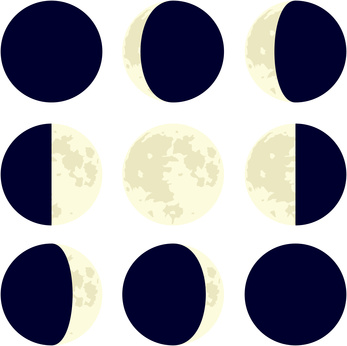 Phases Of The Moon
Phases Of The Moon
The Moon can be used as a personal monthly compass.
Each phase is a stage of unfoldment and supports the next through to the end of the lunar cycle.
To understand what each phase represents helps you to utilize each of these phases effectively in the context of your life.
You will find here an image and description of each of the phases of the Moon to guide you through. You will understand the energies associated with each phase.
The phases are often symbolically referred to as active and receptive phases. Astrologically, the Moon is a symbol for our emotions and how we feel.
Examining each lunar phase can provide an insightful perspective of your emotional landscape as it unfolds over the lunar cycle.
Make sure to join us on our Facebook page.
See our new Facebook Comments section below.
Phase 1 - New Moon Waxing
Keywords: Beginnings, Self Discovery, Intentions, Affirmations
The side of the moon that is facing the Earth is not illuminated by the Sun.
 Phase 1
Phase 1
New Moon
Waxing
Active Phase
This is the beginning of a new cycle. Time to plant the seeds of new beginnings and visualize your goals for the upcoming month.
The moon is not visible at this time.
The energy of this phase can be used to align with intention. It is about self discovery and new beginnings. A time to get clarity on goals and it is helpful to validate throughout the lunar cycle with the use of affirmations and reflection on what has been accomplished especially through the receptive phases.
The new Moon is the moment when the Sun and Moon are in conjunction, meaning that the Sun and Earth are on opposite sides of the Moon.
Phase 2 - Crescent Moon - Waxing Crescent
Keywords: Intuition, Persistence, Opportunity, Evolution
Less than one half of the Moon is illuminated by direct sunlight.
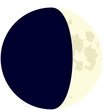 Phase 2
Phase 2
Crescent Moon
Waxing
Receptive Phase
The energy of this phase is about commitment to the intention. Understanding your resources and what it takes to move forward. It is also about nourishing the self - and allowing the growth to come from opportunity.
There is a reflection from the Earth to the Moon called earth shine. The rest of the Moon may be faintly visible because of this. The waxing crescent moon is most visible after sunset.
Phase 3- First Quarter Moon - Waxing
Keywords: Creativity, Clearing, Innovation, Initiation
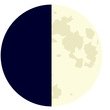 Phase 3
Phase 3
First Quarter Moon
Waxing
Active Phase
In phase three - the first quarter - one half of the Moon is illumined up by the Sun.
Get focused. Assess any obstacles to achieving your goals. Invest in momentum and physical energy - step into the flow.
This illuminated portion is slowly getting larger. During the first quarter, half of the Moon is illuminated, as seen from the earth.
The Moon rises near the middle of the day and sets near the middle of the night.
Phase 4 - Gibbous Moon - Waxing
Keywords: Vision, Preparation, Efficiency, Analysis
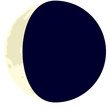 Phase 4
Phase 4
Gibbous Moon
Waxing
Receptive Phase
At this time half of the Moon is lit up. The Sunlit portion lit is slowly getting larger. Waxing means to slowly increase. The period in which the visible surface of the moon increases.
What is working for you and what is not. Pivotal moments here in the energy flow of the entire cycle. Discard what isn't aligning with needs and refine your process.
The waxing gibbous moon occurs between the first quarter and the full Moon. The Sun illuminates more than half of the Moon's surface during this period.
Phase 5 - Full Moon - Waning
Keywords: Illumination, Awareness, Realization, Experience
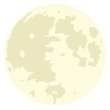 Phase 5
Phase 5
Full Moon
Waning
Active Phase
The side of the Moon that is illumined by the Sun is facing the Earth. The entire Moon is lit up at this point.
The full Moon appears when the Sun and the Moon are on opposite sides of the Earth.
Use the energy of the illumination in this phase to stimulate productivity and engage in relationships to bring harmony, balance and insight into the picture.
This is as seen from Earth and all of the Moon's surface will be visible. The full Moon is generally visible from sunset to sunrise.
Phase 6 - Disseminating Moon - Waning Gibbous
Keywords: Communication, Sharing, Demonstration, Perspective
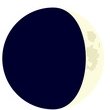 Phase 6
Phase 6
Disseminating Moon
Waning Gibbous
Receptive Phase
The moon is not totally illuminated by sunlight. The part of the Moon this is illumined is slowly getting smaller.
The meaning of waning is to slowly get smaller.. Waning (of the moon) relates to the period during which the visible surface of the Moon decreases.
After the full Moon comes the waning Moon.
The energy here is transformative. Integrate new perspectives and align vision with feelings.
The period between full Moon and third quarter is called gibbous Moon. The portion of the Moon illuminated goes down from full to half during this period.
Phase 7 - Last Quarter - Waning Quarter Moon
Keywords: Integration, Realignment, Responsibility,Completion
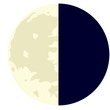 Phase 7
Phase 7
Last Quarter Moon
Waning
Active Phase
Half of the Moon is illumined by the Sun. The part that we can see illuminated is slowly getting smaller.
The third quarter Moon occurs when the other half of the Moon is illuminated compared the first quarter.
This time is about the energy of moving towards the realization of a successful outcome. Doing whatever it takes to finish up.
On the actual day of third quarter, the Moon rises somewhere in the middle of the night and sets in the middle of the day.
Phase 8 - Balsamic Moon - Waning Crescent
Keywords: Contemplation, Clearing, Transformation, Renewal,
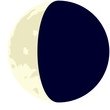 Phase 8
Phase 8
Balsamic Moon
Waning Crescent
Receptive Phase
A small portion of the Moon is illuminated at this point. Each moment it is getting smaller and smaller.
The waning crescent Moon is the period between the third quarter Moon and the next new Moon.
Time to regroup. A reflective point of energy - a time for contemplation. Reframe, step outside the box. Evaluate. Soon time to start anew.
The Moon is most visible before sunset. The Sun illuminates less than half the Moon during this period. It may be possible to see earth shine on the dark side of the Moon when only a small portion of the Moon is visible.
Our Most Popular Moon Resources
- Moon Calendar - A Reference Guide For You
- Moon Cycles - The Meaning of Each Moon Cycle
- Moon Signs - The Moon Through Each of the Signs
- Exploring Your Personal Moon Influences In More Depth
- Moon Phases - Moon Influences and the Phases of the Moon
- Phases of the Moon - A look at the Night Sky
Best Places For You

Discover Your Power Places
Lunar Forecast
Your Personal
Lunar Return
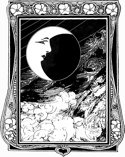 Your Lunar Return
Your Lunar Return
This forecast explores the
patterns and themes of your upcoming month.
Current Moon Phase
Lunar Return
Lunar Return
Exploring Your
Personal Moon Forecast
Moon Resources
Moon Calendar
A Day-by-Day
Reference Guide
Moon Cycles
The Meaning
Of Each Cycle
Moon Signs
The Moon Through
Each Of the Signs
Moon Influences
Moon Influences
And Our Daily Lives
Phases Of The Moon
A Look At The Night Sky







Like This Page?
Facebook Comments